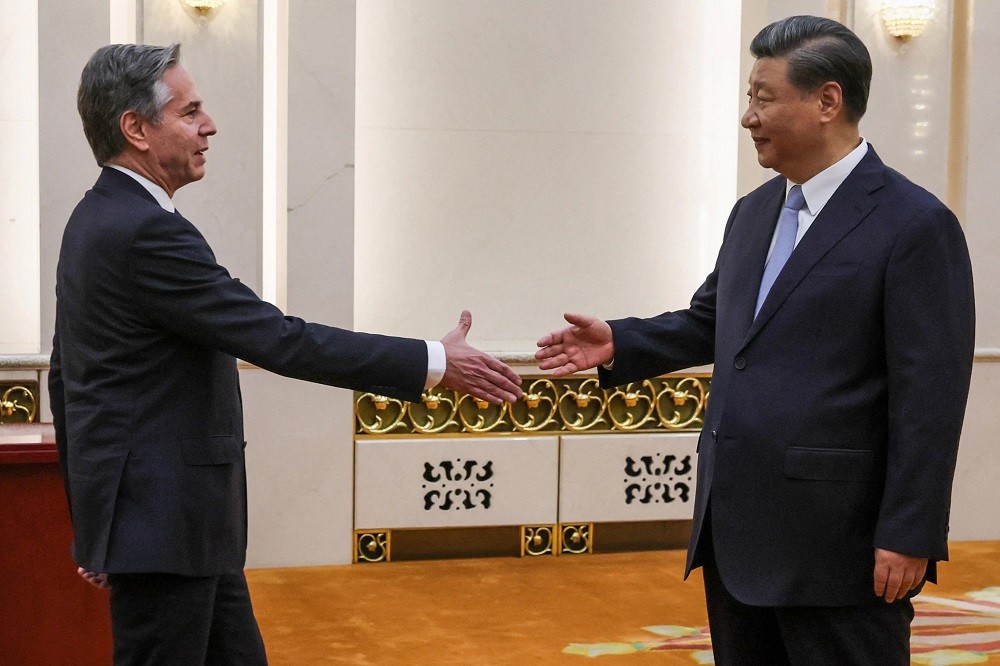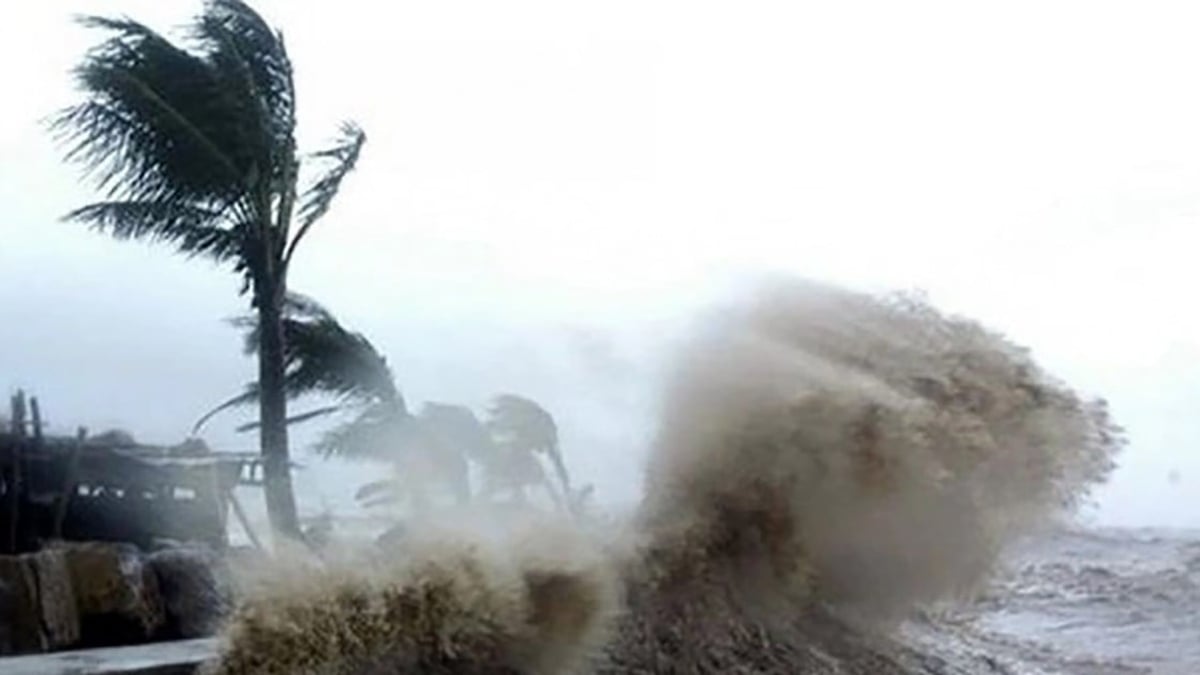NATO's unexpected actions towards Kiev, Chinese Prime Minister's visit to Germany, US's concern about Israel's move... are some notable international news in the past 24 hours.
 |
| US Secretary of State Antony Blinken (left) during a meeting with Chinese President Xi Jinping on June 19. (Source: Reuters) |
The World & Vietnam Newspaper highlights some of the day's international news highlights.
* Russia prevents Ukraine from taking control of village in East Donetsk : On June 19, the Russian Defense Ministry said that its forces prevented Ukraine from regaining control of the village of Novodonetske in the above-mentioned area, where Kiev focused its counterattack.
On the same day, the British Ministry of Defense said that over the past 10 days, Russia has begun to move units of the Dnipro Group of Forces (DGF) from the eastern bank of the Dnipro River to consolidate its positions in Zaporizhzhia and Bakhmut. Accordingly, Russia believes that a major Ukrainian attack across the Dnipro River is now less likely after the Kakhovka Dam collapse, which led to flooding there. (Reuters)
* Russia : Ukraine's combat capability is declining: On June 19, Director of the Russian Foreign Intelligence Service (SVR) Sergei Naryshkin commented that the deaths of many Ukrainian soldiers trained by the North Atlantic Treaty Organization (NATO) and the destruction of equipment will weaken the combat capability of the country's army. Previously, Moscow repeatedly stated that Kiev had suffered serious losses in human lives and weapons in the ongoing counter-offensive campaign. (RIA/Reuters)
* Russia gives reasons for refusing UN request : On June 19, the Kremlin explained that its refusal of UN assistance in Russian-controlled areas affected by flooding after the Kakhovka dam collapse was due to security concerns and “other issues”.
Earlier, on June 18, the UN said Moscow had rejected its offer of assistance, while the death toll rose and polluted water forced beaches in southern Ukraine to close after the Kakhovka dam collapsed in Kherson region. The Kakhovka dam collapse on June 6 sent floods across southern Ukraine and Russian-controlled areas of the Kherson region, destroying homes and farmland and cutting off people's supplies of basic goods. (Reuters)
* Ukraine reports results of counter-offensive: On June 19, writing on Telegram , Ukrainian Deputy Defense Minister Hanna Maliar said: "In two weeks of offensive operations in the direction of Berdiansk and Melitopol, we have liberated eight settlements." Meanwhile, leaders of Russian regions bordering Ukraine said that the Ukrainian side continued to shell the Belgorod and Kursk regions, injuring seven civilians and causing damage to infrastructure. (Reuters)
* Ukraine has not been able to “penetrate” Russia’s defense line : On June 18, CNN (USA) journalist Tim Lister commented that the counterattack of the Ukrainian Armed Forces (VSU) has not yet achieved the momentum expected by “some overly optimistic observers”. Accordingly, the Zaporizhzhia direction is considered by Kiev as the main target, but Ukraine has not been able to penetrate Russia’s multi-layered defense line. There are signs that Kiev, in addition to Zaporizhzhia, is trying to operate around Bakhmut, as well as other directions in the East. It seems that the VSU is trying to pull Russian units in different directions to identify weak points in the defense line.
Lister said the VSU had the ability to choose its attack area, as the Russians needed to defend a winding, 1,000km front. “However, this is a difficult task: In the south, in particular, the VSU has to attack well-prepared defensive positions head-on, and they are severely lacking air superiority. The Russians have had several months to consolidate their defenses here; there has never been an opportunity for the Ukrainians to launch a lightning attack like they did in Kharkov last fall,” he said. (CNN)
* China will not provide lethal weapons to Russia : On June 19, speaking to reporters after two days of talks in Beijing, US Secretary of State Antony Blinken stated: "China has assured us and other countries that it will not provide lethal weapons to Russia for use in Ukraine, now or in the future." In addition, the US Secretary of State also revealed that he had asked the Chinese government to be extremely cautious about the possibility that its companies could provide Russia with technologies that Moscow could use in the conflict in Ukraine. (AFP/Reuters)
* Japan to support Ukraine's reconstruction : On June 19, at a ceremony in Tokyo, Japanese Minister of Reconstruction Hiromichi Watanabe and Deputy Prime Minister in charge of Ukraine's reconstruction Oleksandr Kubrakov signed a memorandum of understanding on a reconstruction assistance initiative for Ukraine. At Kiev's request, Tokyo will pass on to Ukraine advice and knowledge gained from the reconstruction of devastated areas based on the experience gained from the 2011 earthquake and tsunami that hit northeastern Japan. At the same time, the Asian country will support Ukraine in rebuilding homes, schools, restoring clean water supply, wastewater treatment and transport infrastructure that were damaged in the conflict.
For his part, Mr. Kubrakov expressed gratitude for Japan's help in rebuilding Ukraine's infrastructure and economy, saying that "experience and knowledge from Japan are extremely valuable." (Kyodo)
* US Secretary of State meets Chinese President: On June 19, US Secretary of State Antony Blinken had a surprise meeting with Chinese President Xi Jinping in Beijing. Here, he conveyed President Joe Biden's words, saying that Washington and Beijing have an obligation to manage bilateral relations and the US side is committed to fulfilling this obligation.
For his part, President Xi Jinping stressed that “China respects the interests of the United States and does not seek to challenge or replace the United States.” He said that Beijing and Washington should act responsibly toward history, for the people of both countries and for the world. According to President Xi Jinping, neither side should force the other to act according to its will. He called on the United States to adopt a rational, pragmatic and cooperative attitude toward China, and expressed confidence that the two major powers can overcome their differences and find the right path to cooperation.
For his part, during a previous meeting with Mr. Blinken, Director of the Office of the Foreign Affairs Commission of the Communist Party of China Central Committee Wang Yi emphasized: “We must take a responsible attitude towards the people, history and the world, and reverse the downward spiral of US-China relations.”
In addition, during his two-day visit to Beijing, US Secretary of State Antony Blinken met separately with his host counterpart. Speaking at a press conference at the end of the visit, he said he had "candid and constructive" talks with senior Chinese officials. (Reuters/Xinhua)
| RELATED NEWS | |
 | US President Biden says he will not 'make special arrangements' for Ukraine to join NATO, expects to meet with Chinese President |
Southeast Asia
* Cambodian Prime Minister concerned about the situation in Myanmar : On June 19, speaking at the inauguration ceremony of the Bakheng water treatment plant in the Chroy Changvar district of the capital Phnom Penh, Prime Minister Hun Sen stated: "The situation in Myanmar is getting worse. Previously, the "5-point consensus" was put forward with the aim of preventing violence... but now we need to prevent clashes from spreading." The Cambodian leader affirmed that he always raised this concern at the summits of the Association of Southeast Asian Nations (ASEAN).
At the invitation of Thailand's Deputy Prime Minister and Acting Foreign Minister Don Pramudwinai, Cambodian Deputy Prime Minister and Minister of Foreign Affairs and International Cooperation Prak Sokhonn is currently participating in an informal meeting on the situation in Myanmar, taking place in Thailand from June 18-19. This face-to-face discussion will contribute to finding ways to implement the proposals of some leaders at the 42nd ASEAN Summit in May 2023, and further promote the implementation of the Five-Point Consensus, as well as the 15-point ASEAN Leaders' Review and Decision on the Implementation of the Five-Point Consensus. (AFP)
| RELATED NEWS | |
 | Cambodia: In the first 5 months of 2023, international tourist arrivals increased by more than 500% |
Northeast Asia
* North Korea-China trade turnover drops : On June 19, China's General Administration of Customs released monthly trade data. According to the data, the country's trade turnover with North Korea reached 189.57 million USD in May, down from 199.42 million USD in April. Of which, Pyongyang's import turnover from China remained at 165 million USD last month.
It was not immediately clear why North Korea's exports to China fell last month. However, total bilateral trade between January and May 2023 reached $874.18 million, up 174% from a year earlier. Rail freight transport between the Chinese border city of Dandong and North Korea's Sinuiju resumed in September last year after a five-month hiatus due to the Covid-19 pandemic. (Yonhap)
| RELATED NEWS | |
 | South Korea and global aspirations |
Europe
* NATO does not invite Ukraine to the summit : On June 19, speaking after meeting with German Chancellor Olaf Scholz in Berlin, NATO Secretary General Jens Stoltenberg said the bloc had not invited Ukraine to attend the summit in Vilnius (Lithuania) next July. He stated: "At the Vilnius summit and in the preparation for this event, we did not discuss sending an official invitation (to Ukraine)". According to the NATO Secretary General, the leaders of member countries will discuss how to bring Ukraine closer to this military alliance.
He also opposed the idea of accepting a freeze in the conflict in Ukraine in exchange for ending the war. “We all want the conflict to end, but a just peace does not mean freezing the conflict and accepting the deal offered by Russia,” the NATO Secretary General stressed. (Reuters)
* NATO calls for halt to escalation of conflict in Kosovo : Speaking in Berlin on June 19, NATO Secretary General Jens Stoltenberg called on all parties in Kosovo to stop all actions that escalate tensions and immediately return to the dialogue initiated by the European Union. This official pledged: "The peacekeeping force in Kosovo - KFOR - continues to take all necessary measures to ensure a safe and secure environment." Previously, NATO emphasized KFOR's "unwavering" commitment to security missions in Kosovo, demonstrated by the recent move to urgently send 500 additional soldiers to the region. (Reuters)
* Chinese Premier seeks “new development” with Germany: On June 19, Chinese Premier Li Qiang arrived in Berlin, starting his visit to Germany. He is expected to meet with German President Frank-Walter Steinmeier, chair the 7th China-Germany Intergovernmental Consultation with his host counterpart Olaf Scholz, attend the China-Germany Economic and Technical Cooperation Forum, meet with representatives of the German business and industrial communities, and visit German companies in Bavaria.
Speaking after arriving in Germany, Chinese Premier Li Qiang stressed that Berlin is the first stop on his first overseas visit since taking office. The visit promotes the traditional friendship between the two countries, expands the areas of cooperation and opens new prospects for bilateral relations.
He said that over the years, bilateral relations have witnessed steady development, unlocking many new achievements in economics, trade, technology, cultural exchanges, and green development. Beijing affirmed its willingness to have frank and substantive exchanges with Berlin based on the principle of mutual respect, seeking common ground while preserving differences to achieve mutually beneficial results.
According to Mr. Li, this is a good opportunity to continue exploring the potential for cooperation, properly handle differences and enrich the Comprehensive Strategic Partnership. These efforts will send a positive and strong signal to maintain a stable, peaceful and prosperous global supply chain for the world. (Xinhua)
* Germany warns of security concerns over Huawei products : On June 19, the country's Interior Ministry assessed that there are clear signs that the use of Huawei's technology and products in the Western European country could affect public order or security. In response to this risk, the German Interior Ministry and Foreign Ministry support the implementation of tough measures against Chinese technology companies. Meanwhile, the German Digital and Transport Ministry is concerned that the decision to abandon Chinese telecommunications technology will cause billions of euros in losses. (TTXVN)
| RELATED NEWS | |
 | German National Security Strategy: Necessary but Sufficient? |
Middle East-Africa
* Qatar and UAE restore diplomatic missions : On June 19, the Qatari Foreign Ministry said that the country and the United Arab Emirates (UAE) have agreed to resume operations of their respective embassies.
Bilateral relations have been disrupted since mid-2017, when a series of Gulf countries boycotted Qatar, accusing it of supporting terrorism. Doha has consistently denied the accusation. In early 2021, under the mediation of the United States and Kuwait, the Gulf countries agreed to end the boycott. (Reuters)
US concerned about Israel's expansion of settlements in the West Bank: On June 19, US State Department spokesman Matthiew Miller said Washington was "deeply concerned" about Israel's decision to build more than 4,000 settlement units in the West Bank. He stressed Washington's longstanding policy of opposing unilateral actions that impede the two-state solution. Washington called on the Jewish state to fulfill its commitments made in Aqaba (Jordan) and Sharm El Sheikh (Egypt) and return to dialogue to ease tensions.
Earlier, on June 18, Israel announced plans to approve 4,560 apartments in the West Bank. The country's cabinet also agreed to hand over authority over these areas, which belong to the Defense Ministry, to Israeli Finance Minister Bezalel Smotrich, a hard-line politician. The US had previously warned Israel about this move, considering it an obstacle to lasting peace with the Palestinians. (Anadolu)
Source









![[Video] More than 100 universities announce tuition fees for the 2025–2026 academic year](https://vphoto.vietnam.vn/thumb/1200x675/vietnam/resource/IMAGE/2025/7/18/7eacdc721552429494cf919b3a65b42e)



















































































![[Infographic] In 2025, 47 products will achieve national OCOP](https://vphoto.vietnam.vn/thumb/402x226/vietnam/resource/IMAGE/2025/7/16/5d672398b0744db3ab920e05db8e5b7d)





Comment (0)